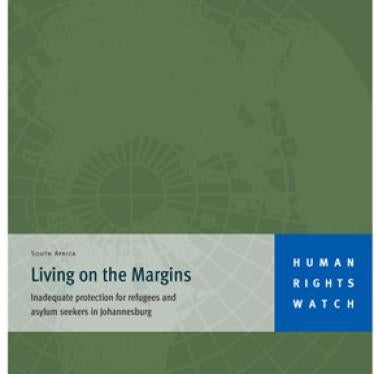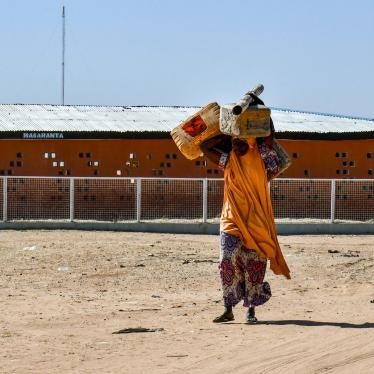(Johannesburg, November 17, 2005) - Asylum seekers and refugees in Johannesburg often face harassment, mistreatment and extortion by the police, Human Rights Watch said in a report released today. The South African government must provide better protection and assistance in the process for determining refugee status.
The 66-page report, "Living on the Margins: Inadequate Protection for Refugees and Asylum Seekers in Johannesburg," documents how refugees and asylum seekers in South Africa's largest city often encounter abuse by police and other obstacles throughout the refugee-status determination process.
"On paper, South Africa has exemplary laws to protect refugees and asylum seekers," said Georgette Gagnon, deputy Africa director of Human Rights Watch. "But in practice, the government is failing to provide protection to these vulnerable individuals."
South Africa hosts approximately 142,000 refugees and asylum seekers. Many of them have fled conflict areas and persecution in countries such as the Democratic Republic of Congo, Burundi, Côte d'Ivoire and Zimbabwe. The refugee reception office in Johannesburg accounts for nearly three-fourths of South Africa's pending asylum applications and handles 75,000 out of some 115,000 pending applications countrywide.
Asylum seekers and refugees in Johannesburg are often subjected to harassment, mistreatment and extortion by the police. Police officers required to verify the immigration status of a person are often unfamiliar with the specifics of refugee and asylum law and procedures. Police often question the validity of the array of official identity documents which increases the risks of deporting a refugee or asylum seeker to a place where they may face persecution.
"Asylum seekers and refugees should not have to bribe a policeman to avoid unjust arrest, detention or possible deportation," said Gagnon. "The police should be familiar with asylum documents, be able to verify them quickly and punish corrupt elements within their ranks."
Obtaining official documents remains difficult for asylum seekers, however. Upon crossing the border into South Africa, asylum seekers receive a temporary document that gives them 14 days to apply for asylum. This document sets out their legal status and is supposed to protect them until they receive asylum-seeker permits that will shield them from risk of arrest for being "illegal." However, the temporary document often expires weeks or months before they receive their asylum-seeker permits. This is the first of several "documentation gaps" that leave asylum seekers in jeopardy of insecurity.
Insufficient staff and inadequate equipment are major causes for long delays in the asylum procedures. This situation is made worse because of inconsistent implementation of a decision of the Standing Committee for Refugee Affairs authorizing asylum seekers to work by the Department of Home Affairs in Johannesburg. Many asylum seekers unable to support themselves are left destitute although they have the legal right to work.
The long delays in processing applications become a critical concern due to the precarious legal and economic situation of many asylum seekers while their claims are pending, which can stretch to more than one year. The Department of Home Affairs is required to process asylum applications within the legally stipulated six-month period.
"Refugees and asylum seekers are already marginalized. They shouldn't have to endure additional hardships as a result of government inefficiency," said Gagnon, "The South African government should show greater commitment in respecting the rights of asylum seekers and refugees."
Once an asylum application is successful, a refugee benefits from a broad refugee definition outlined in South African law. However, when refugees are recognized and granted status, the issuance of refugee documentation is not automatic. This further hampers the individual's full access to his or her rights.
Human Rights Watch urged the South African government to provide greater protection to asylum seekers and refugees, and to ensure that documents issued are recognized by public and private agencies. Specific training should be provided to the police to ensure that refugees and asylum seekers are not routinely, and mistakenly, arrested and detained as "illegal foreigners." The South African authorities should guarantee that adequate staff is in place to process asylum applications in the timeframe stipulated by law.







